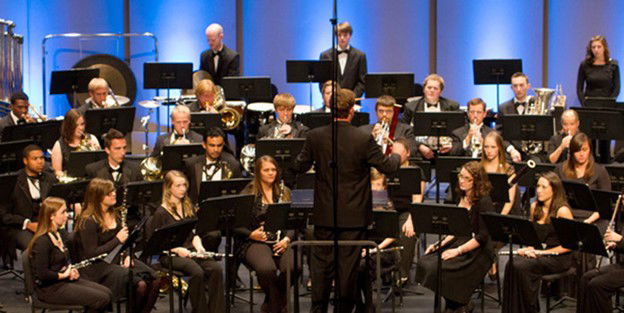Playing in a Concert Band is More Than Just Fun

Playing in a concert band, whether that be a public, private or homeschool high school concert band or a community concert band offers many benefits to participants, promoting personal, social, and academic growth. This article explores the advantages of being part of a concert band, emphasizing its impact on developing musical skills, fostering teamwork, enhancing thinking skills, and promoting overall well-being. And, even though there are benefits for community band members, we’re going to deal mostly with high school age students, whose need for the benefits are the greatest. By actively engaging in a wide range of musical experiences, participants not only become proficient musicians but also cultivate essential life skills that contribute to their success wherever they may be.
A concert band is a group of talented musicians who come together to create a variety of music. Participating in such an ensemble can be an incredibly rewarding experience for students, as it not only nurtures their musical talents but also offers many other benefits that positively influence their personal and academic lives. In this article, we will explore the many advantages of being part of a high school concert band.
1. Musical Skill Development: Developing a musical skill is a multifaceted endeavor. Here are a few ways in which this is accomplished:
> Joining a concert band provides students with a unique opportunity to learn and master an instrument of their choice. However, not all instruments are suited for all students, and vice versa, just as most men don’t sing soprano and women don’t sing bass. Especially for wind instruments, things like the age and size of the student, mouth shape and placement of teeth can help determine what kind of instrument is better for a beginning student. Larger lips are better suited for a low brass or woodwind instrument. Even rare and peculiar physical anomalies can come into play. If a student is missing one or more fingers, an instrument like a clarinet or flute would be impossible to play, but a trombone or possibly a trumpet would be a good fit, provided that other physical features are adequate.
> Regular practice and performance hone their technical skills and musical understanding, leading to improved proficiency. A student must either possess or have the willingness to develop the habit of regular, efficient practice, and an enthusiasm for participating in the rehearsals and concerts that are part of the process. Students must also have or be willing to gain a sense of organization of time, materials and talent so that they may make the most of their musical skills.
> Exposure to various musical styles helps to broaden their musical horizon and appreciation of different traditions. A concert band can play anything from a well-arranged Sousa march to a jazz piece, Broadway musical, ragtime tune, tone poem and Avant Garde neo-classical composition.

2. Enhanced Cognitive Abilities: Research has shown that music education, including participation in a concert band, positively impacts cognitive development much more effectively than not being actively engaged in music. Learning to read sheet music, memorize pieces, and interpret musical symbols stimulate the brain, enhancing memory, focus, and concentration by way of creating and utilizing brain synapses (connections or hubs of nerves).
After new synapses have been developed during the seeing, playing and hearing process, they can then be used by the brain to carry other signals when that person encounters new information about any subject. The new information is then learned, stored and applied much more easily than before. Then, once those new synapses are in place and being used, new music can be learned faster and better than before. Analysis, understanding and use of the music’s theory, style and utilization are enhanced greatly.
3. Teamwork and Collaboration: In a concert band, musicians learn the essence of teamwork and collaboration. Each member plays a unique role, and their combined efforts create a well-balanced performance. Learning to listen to one another, adapt to different playing styles, and work towards a common goal fosters valuable interpersonal skills that extend beyond the musical realm.
It has often been said that team sports also develop teamwork and collaboration. This is true, but musicians in a band often must exhibit these qualities to a higher degree than players on a sports team. On a sports team, there is often a general objective for which each team aims. However, the individual players are also required to adjust the way in which they reach that objective. In any music ensemble, the music and the conductor guide the whole group toward the goal, as a cohesive unit, with no room for individual improvisation, unless, of course, it’s a jazz piece in which improvisation is encouraged. But, even then, the improvisation must be done within the framework of the key signature, chord progression and tempo of the rest of the band.

4. Discipline and Time Management: Being part of a concert band demands commitment and discipline. Musicians must dedicate time to practice regularly, attend rehearsals, and prepare for performances. These discipline and time management skills often must be encouraged by parents, first of all. Not all home situations are ideal, so, if this is not happening, teachers and conductors must step in and gently encourage such habits.
Practice is what a musician does alone, working out such things as intricate passages and scales, phrasing, attacks and breathing. Some musicians call it “woodshedding” because it feels like punishment, although it’s really self-correction with an eye on the prize of a higher level of proficiency.
Rehearsal is what musicians do with the other musicians with whom they will perform. They learn to follow the conductor, take their lead form the section leaders, work with the other musicians in their section and the band, and accommodate any irregularities that may arise, like missed cues or noticeable wrong notes.
This responsibility instills discipline and time management skills, enabling them to balance their academic/work and extracurricular commitments effectively.
5. Confidence and Self-Esteem: Through regular performances, musicians build confidence in their musical abilities. The applause and recognition received from audiences provide a sense of achievement, boosting their self-esteem. This newfound confidence often extends to other aspects of their lives, encouraging them to take on new challenges and pursue their passions.

Stress Relief and Emotional Well-being: Music has therapeutic qualities, and playing in a concert band can serve as a stress reliever for students. Engaging in musical activities helps reduce anxiety and promotes emotional well-being. It provides an outlet for self-expression, allowing students to channel their emotions positively.
Personal Story – When I was in college, the college chapel was about fifty yards from my dorm. Sometimes, after studying for hours late into the night, I would take a break and go to the chapel and play the grand piano that was in there. Other students, hearing the music, would come in to listen and talk a bit. (It would have been a good time to set out a tip jar.) Other times, I would take my trumpet and, sitting on the edge of the balcony, would improvise some sweet melody. Either way, it was a great stress reliever, better and healthier than drugs or alcohol.
7. Leadership and Responsibility: In a concert band, leadership opportunities exist for students to take on roles such as section leaders, student conductors or even as young arrangers and composers. Assuming these responsibilities helps them develop leadership qualities, learn to motivate and guide their peers, and fosters a sense of accountability.
> Section Leaders must show musical proficiency and skill on their instruments. This includes not only how to read, interpret and play the music properly, but also how to care for and maintain their instruments well. They must show leadership qualities and responsibility. This includes setting high standards without appearing haughty, and being able to lead without being overbearing. Though difficult for event the most experienced teachers, a section leader should be able to sense the different ways that the individuals in their section hear and learn, and how they interpret different leadership methods. Here is one very general difference between the way that males and females take direction. Males are usually quite comfortable with being given a direct order, especially if it’s given in a “flat tone” of voice. For example, telling a male musician, “Joe, that should be an A flat, not an A” is likely to be well received and acted on. Females, on the other hand, are much more likely to respond well to direction if it is presented as a request for help or as an invitation to further the cause of the team. Conveying the same information to a female musician might be said as, “Sue, we need to play that A as an A flat so we sound right.”
> Conducting is as much an art as a definitive skill. For the most part, student conductors will learn their skill from the teacher of the band in which they play. There are a number of good resources for beginning conductors to learn the rudiments and simple nuances of conducting. It’s very helpful for students to learn the proper ways so that they can conduct any band, anywhere. If a conductor has a “style” that an ensemble must get used to, it’s not a very helpful situation. Now, the players must not only learn the music, but also must learn the conductor.
Personal Stories –
#1 When I was in high school, the choral conductor used his hands to conduct. He also tended to fold his index finger inward just before an accented place, dynamics change or entrance, and the extend it to match the rest of his outstretched fingers. Unconsciously, whenever I conducted any vocal group, I would do the same. I was also asked by my conducting professor in college what that motion was. I had to consciously refrain from doing it throughout that class.
#2 Both my choral and concert band teachers conducted the same basic way, confining the right hand motions to an imaginary box between their shoulders, using the left hand sparingly, for cues, accents and tempo changes, and other fine nuances such as not pointing at tenors or trumpet players to indicate their cues.
> Student Arrangers and Composers are few between, but when the skill presents itself, it should be encouraged. There are a dozen or more recommendations for such ambitious young people, but that will have to be addressed in a different article.
8. Cultural Enrichment: By performing music from various cultures and time periods, students gain a deeper understanding and appreciation for the rich diversity of global music. This exposure promotes cultural awareness and empathy, fostering a more comprehensive and understanding worldview.
9. Networking and Social Connections: Being part of a concert band allows students to form strong social connections with like-minded individuals who share their passion for music. Often, those who perform music share similar interests with others that have the same type of personality bent, e.g., by and large, musicians would not be interested in boxing or tractor pulls, but might share an interest in other creative or more tranquil activities. These friendships can last a lifetime and create a supportive network of peers who encourage each other's musical and personal growth.
10. Using God’s musical gifts: Not everyone has musical skill, so it’s important for those who have them to use the musical gift that God has given them. Concert band offers an excellent way for participants to display and share that gift. It also affords a church’s praise band with more instrumentation than the standard rhythm section.
Finally - Playing in a concert band offers a wide variety of benefits that extend well beyond the realm of music. From enhanced cognitive abilities and improved discipline to fostering teamwork and building self-confidence, students gain invaluable life skills that contribute to their overall development. Concert band experiences enrich their lives, creating well-rounded individuals who are better prepared to face the challenges of the future. Therefore, it is imperative for educational institutions to continue promoting and supporting these programs to nurture the talents and potential of their students.
Salt Cellar Creations understands the beauty and power that a Concert Band can convey and has a growing library of concert band music. Some of the selections are original compositions, many of which have a musical secret about them. The Minuet in Four is a pop-rock arrangement of the Minuet in G by Bach/Petzold. Baroquen Carriage is fashioned after Mason Williams’ Classical Gas, but has features of its own. Rockin’ Rondo is a rock song in a full rondo form. Its ending sneaks to the dominant chord instead of tonic. Others are arrangements of well-known classic pop tunes like Bridge Over Troubled Water and Classical Gas.
(A personal note: Bridge Over Troubled Water, Classical Gas and Windy were the first band arrangements that I did, while I was in high school. I made just a few changes to make them accessible to more bands.) Find out more about what Salt Cellar Creations has to offer for Concert Bands HERE. Explore the available music HERE.
SCC can also compose an original piece for you or do a custom arrangement for you. There are two ways that this can be done; one is much more affordable than the other. And SCC is always looking for ideas of pieces to arrange or suggestions for original pieces.
We have sold music not only in the US but in Canada, the United Kingdom, France, Australia, New Zealand and Austria. Please visit the WEBSITE or CONTACT US to let us know what we can do for you.